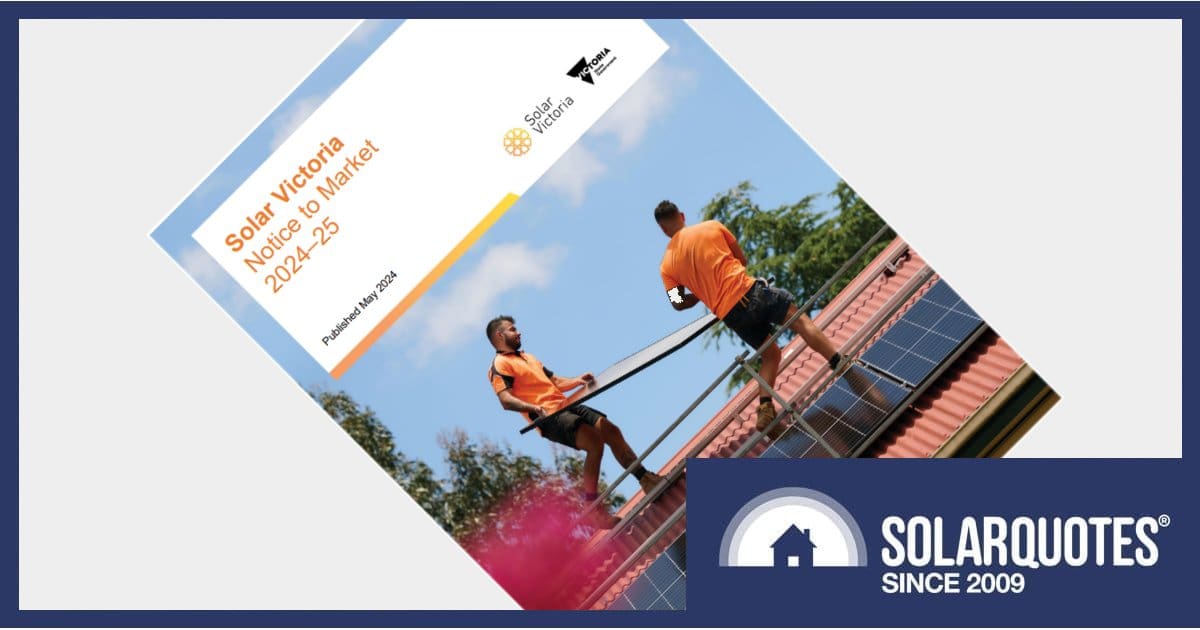
Businesses participating in Victoria’s Solar Homes program will have additional requirements come into force on July 1 this year. Here’s a summary.
The Solar Homes program offers incentives to encourage the uptake of heat pump and solar hot water systems, home batteries, and of course there’s the hugely popular Victorian solar panel rebate that is available is in addition to the national rebate.
Since it was launched in 2018, 257,000 rooftop solar systems have been installed under the Solar Homes program, with a collective capacity of 1.7 gigawatts. The program has also supported the installation of 19,000 hot water systems and almost 17,000 solar battery systems across the state.
And there should be a lot more to come under the scheme – over its 10- year duration, the program aims to enable the installation of solar panels, hot water systems or batteries on 770,000 Victorian homes.
As the program has evolved, so too have the rules of the road in order to minimise bad behaviour, reflect changing standards and the changing energy landscape. Tweaks to the program are communicated via “Notices to Market” from Solar Victoria, which oversees the program.
The latest Notice to Market dropped last week and contains a few new (or new-ish) mandatory or updated requirements, and also some recommendations.
Mandatory Requirements
Developed in consultation with trade bodies, government agencies, retailers and manufacturers, installers, consumer advocates and recyclers, these new/updated mandatory requirements will come into effect on July 1, 2024, and include:
- An active internet connection for solar PV and batteries, wherever possible, to support emergency backstop and flexible exports.
- Retailers must ensure battery installers are provided with an AS/NZS 5139 compliant labelling kit.
- Retailers will be obliged to remove solar panels and/or system components from residences where systems are upgraded or replaced.
- Telemarketing or door-to-door sales of systems eligible under the Solar Homes Program is banned1.
- Provision of a minimum five-year whole-of product warranty on all major components provided for solar sharing technology.
- Interface protection for inverter power sharing devices greater than 30 kVA.
- An important one (and assuming businesses don’t fudge figures) – providing a financial performance estimate to prospective solar PV and home battery system buyers; empowering them to make better-informed purchase decisions.
- Heat pump hot water systems must contain low Global Warming Potential (GWP) refrigerants.
- Hot water heat pump installers will need to hold a Refrigerant Handling Licence issued by the Australian Refrigeration Council (ARC) where installations will have synthetic refrigerant circulating through the pipework.
Failure to observe these new or existing requirements can result in suspension or cancellation of participation in the Solar Homes Program.
Recommendations (For Now)
Also listed were a number of recommendations – but recommendations have a habit of becoming mandatory, so it pays to take note.
There are several recommendations concerning hot water, and for PV the recommendation relates to the mandatory requirement of removing solar panels and/or system components after upgrades or replacements :
“.. retailers keeping records and evidence of solar panel (PV) and systems disposal to a lawful place.”
“Lawful place” are important words here. There is a ban on sending electronic waste to landfill in Victoria, and this includes solar panels, inverters and other solar electronics. Getting pinged for not using a “lawful place” can result in fines of up $82,610 for individuals and up to $413,050 for companies. Repeat offenders can face up to two years in jail.
Proper disposal and recycling/repurposing of solar waste will become increasingly important in the years ahead as more systems reach the end of their service life.
But waste is building already, with crap and/or poorly installed systems failing before their time – hence tightening of program rules over the years. Additionally, some owners of small, ageing systems installed early on in Australia’s home solar revolution are replacing them to maximise returns from their rooftop real estate. They are taking advantage of current low solar panel prices and the fact they can still receive another *national* solar rebate (but no double-dips for the Victorian rebate at the same address).
Commenting on the latest Notice to Market, Minister for Climate Action, Energy and Resources, and the State Electricity Commission Lily D’Ambrosio said:
“The Solar Victoria Notice to Market plays an important role in supporting the stronger, highly skilled and quality-committed industry needed to take on the current and future energy requirements of all Victorians.”
Solar Victoria boss Stan Krpan stated:
“We thank industry for its ongoing commitment to safety and quality, helping Victorians transition to clean energy. Meeting these requirements will help deliver the best safety and quality outcomes for Victorians who are enthusiastically making the switch to more energy efficient all-electric homes.”
The full Notice to Market 2024–25 with more detail on each new and existing requirement can be viewed here.
Footnotes
- A doorknocking ban has been in place since 2021, and a ban on telemarketing for Solar Homes actually came into effect on May 1 this year. ↩

 RSS - Posts
RSS - Posts



What is the reason for retailers to remove upgraded solar systems. Some inverters are rubbish. If home owners like to replace not performing well inverters they should be replaced by better brands. Common sense should prevail and not punishment like some communist countries.